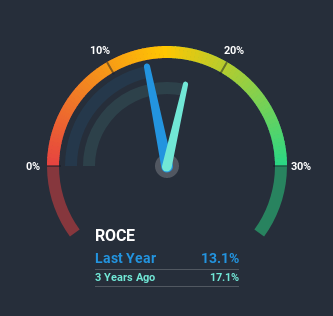Here's What To Make Of SKAKO's (CPH:SKAKO) Returns On Capital

Finding a business that has the potential to grow substantially is not easy, but it is possible if we look at a few key financial metrics. Ideally, a business will show two trends; firstly a growing return on capital employed (ROCE) and secondly, an increasing amount of capital employed. This shows us that it's a compounding machine, able to continually reinvest its earnings back into the business and generate higher returns. In light of that, when we looked at SKAKO (CPH:SKAKO) and its ROCE trend, we weren't exactly thrilled.
Understanding Return On Capital Employed (ROCE)
Just to clarify if you're unsure, ROCE is a metric for evaluating how much pre-tax income (in percentage terms) a company earns on the capital invested in its business. To calculate this metric for SKAKO, this is the formula:
Return on Capital Employed = Earnings Before Interest and Tax (EBIT) ÷ (Total Assets - Current Liabilities)
0.13 = kr.21m ÷ (kr.330m - kr.169m) (Based on the trailing twelve months to September 2020).
Thus, SKAKO has an ROCE of 13%. In absolute terms, that's a satisfactory return, but compared to the Machinery industry average of 8.4% it's much better.
View our latest analysis for SKAKO

While the past is not representative of the future, it can be helpful to know how a company has performed historically, which is why we have this chart above. If you want to delve into the historical earnings, revenue and cash flow of SKAKO, check out these free graphs here.
What The Trend Of ROCE Can Tell Us
When we looked at the ROCE trend at SKAKO, we didn't gain much confidence. Over the last five years, returns on capital have decreased to 13% from 20% five years ago. However it looks like SKAKO might be reinvesting for long term growth because while capital employed has increased, the company's sales haven't changed much in the last 12 months. It may take some time before the company starts to see any change in earnings from these investments.
Another thing to note, SKAKO has a high ratio of current liabilities to total assets of 51%. This effectively means that suppliers (or short-term creditors) are funding a large portion of the business, so just be aware that this can introduce some elements of risk. While it's not necessarily a bad thing, it can be beneficial if this ratio is lower.
In Conclusion...
Bringing it all together, while we're somewhat encouraged by SKAKO's reinvestment in its own business, we're aware that returns are shrinking. And with the stock having returned a mere 34% in the last five years to shareholders, you could argue that they're aware of these lackluster trends. As a result, if you're hunting for a multi-bagger, we think you'd have more luck elsewhere.
If you want to know some of the risks facing SKAKO we've found 3 warning signs (1 is concerning!) that you should be aware of before investing here.
While SKAKO isn't earning the highest return, check out this free list of companies that are earning high returns on equity with solid balance sheets.
When trading SKAKO or any other investment, use the platform considered by many to be the Professional's Gateway to the Worlds Market, Interactive Brokers. You get the lowest-cost* trading on stocks, options, futures, forex, bonds and funds worldwide from a single integrated account. Promoted
New: Manage All Your Stock Portfolios in One Place
We've created the ultimate portfolio companion for stock investors, and it's free.
• Connect an unlimited number of Portfolios and see your total in one currency
• Be alerted to new Warning Signs or Risks via email or mobile
• Track the Fair Value of your stocks
This article by Simply Wall St is general in nature. It does not constitute a recommendation to buy or sell any stock, and does not take account of your objectives, or your financial situation. We aim to bring you long-term focused analysis driven by fundamental data. Note that our analysis may not factor in the latest price-sensitive company announcements or qualitative material. Simply Wall St has no position in any stocks mentioned.
*Interactive Brokers Rated Lowest Cost Broker by StockBrokers.com Annual Online Review 2020
Have feedback on this article? Concerned about the content? Get in touch with us directly. Alternatively, email editorial-team (at) simplywallst.com.
About CPSE:SKAKO
SKAKO
Designs, develops, and sells vibratory feeding, conveying, and screening equipment in Europe, North America, Africa, and internationally.
Adequate balance sheet slight.
Market Insights
Community Narratives



